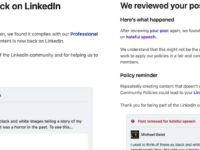The explosive growth of antisemitism in Canada since October 7th is well documented with shooting at schools, the need for a regular police presence at synagogues and community centres, arrests on terrorism offences, and protests targeting Jewish owned businesses and communities. So in that context, some antisemitic graffiti at a bus stop in Toronto over the weekend might have been just one more incident to add to the list that now runs into the hundreds. Yet I found the image of “No Service For Jew Bastards” particularly chilling, evoking memories of the holocaust and of similar hateful messages that have frequently targeted minority communities over the years. I proceeded to post a tweet and a LinkedIn post with the photo and a caption:
Latest Posts
The Law Bytes Podcast, Episode 194: CCH Turns 20 – Scott Jolliffe Goes Behind the Scenes of the Landmark Copyright Case That Ushered in Users’ Rights
Twenty years ago today the Supreme Court of Canada released CCH Canadian v. Law Society of Upper Canada, a decision that stands as perhaps the most consequential in Canadian copyright law history as it would firmly establish fair dealing as a users right and serve as the foundation for copyright law in Canada for decades to come. Leading off the hearing several months earlier for the Law Society was Scott Joliffe, an IP litigator with the law firm Gowlings. Joliffe was charged with arguing the fair dealing aspects of the case, but it was only at last moment that users right entered the picture. To mark its 20th anniversary, Joliffe joins the Law Bytes podcast to talk about the CCH case, his strategy and insights from the hearing, and his thoughts on its impact many years later.
Why the Criminal Code and Human Rights Act Provisions Should Be Removed from the Online Harms Act
Having a spent virtually the entire day yesterday talking with media and colleagues about Bill C-63, one thing has become increasingly clear: the Criminal Code and Human Rights Act provisions found in the Online Harms Act should be removed. In my initial post on the bill, I identified the provisions as one of three red flags, warning that they “feature penalties that go as high as life in prison and open the door to a tidal wave of hate speech related complaints.” There is no obvious need or rationale for penalties of life in prison for offences motivated by hatred, nor the need to weaponize human rights complaints by reviving Human Rights Act provisions on communication of hate speech. As more Canadians review the bill, there is a real risk that these provisions will overwhelm the Online Harms Act and become a primary area of focus despite not being central to the law’s core objective of mitigating harms on Internet platforms.
My First Take on the Online Harms Act: Worst of 2021 Plan Now Gone But Digital Safety Commission Regulatory Power a Huge Concern
After years of delay, the government tabled Bill C-63, the Online Harms Act, earlier today. The bill is really three-in-one: the Online Harms Act that creates new duties for Internet companies and a sprawling new enforcement system, changes to the Criminal Code and Canada Human Rights Act that meet longstanding requests from groups to increase penalties and enforcement against hate but which will raise expression concerns and a flood of complaints, and expansion of mandatory reporting of child pornography to ensure that it includes social media companies. This post will seek to unpack some of the key provisions, but with a 100+ page bill, this will require multiple posts and analysis. My immediate response to the government materials was that the bill is significantly different from the 2021 consultation and that many of the worst fears – borne from years of poorly thought out digital policy – have not been realized. Once I worked through the bill itself, concerns about the enormous power vested in the new Digital Safety Commission, which has the feel of a new CRTC funded by the tech companies, began to grow.
The Law Bytes Podcast, Episode 193: The Online Harms Act is Nearly Here – A Backgrounder and Preview
The government plans to introduce the Online Harms Act later today, bringing forward long-delayed legislation that will include new responsibilities and liabilities for Internet platforms alongside an extensive complaints and enforcement governance structure. What is likely to be Bill C-63 will focus on protecting children online and will be the most contentious of the government’s Internet regulation bills given the challenge of balancing safeguards with freedom of expression.
This week’s Law Bytes podcast features a combined backgrounder and preview of the bill as I walk through the years of failed consultations, expert panels, changing ministers, and challenges in bringing it forward, highlight the key issues at stake, and contrast the online harms bill with Bill S-210, which seems destined to share the spotlight.











